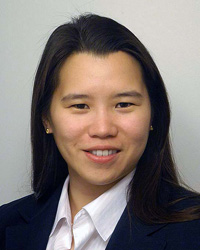
Cynthia Sung, Ph.D.
Associate Professor
Mechanical Engineering & Applied Mechanics
Secondary Appt in Computer and Information Science
Secondary Appt in Electrical and Systems Engineering
School of Engineering and Applied Science
University of Pennsylvania
Email: crsung (at) seas.upenn.edu
Office: Towne 273
Phone: (215) 746-6057
Bio: Cynthia Sung is an Associate Professor in the Department of Mechanical Engineering and Applied Mechanics (MEAM) and a member of the General Robotics, Automation, Sensing & Perception (GRASP) lab at the University of Pennsylvania. She completed a Ph.D. (2016) in Electrical Engineering and Computer Science at MIT, advised by Prof. Daniela Rus, and a B.S. (2011) in Mechanical Engineering from Rice University. Her research interest is computational design and fabrication for robotic systems, with a particular focus on origami-inspired and compliant robots. She is the recipient of a 2023 ONR Young Investigator award, 2019 NSF CAREER award, 2020 Johnson & Johnson Women in STEM2D Scholars Award, and a 2017 Popular Mechanics Breakthrough Award.
Teaching:
MEAM 5200 Introduction to Robotics (Fall 2017-2020, Fall 2024)
This course introduces the fundamental kinematic, dynamic, and computational principles underlying most modern robotic systems. The main topics of the course include: homogeneous transformations, manipulator forward kinematics, manipulator inverse kinematics, Jacobians, and trajectory planning. The purpose of the course is to provide you with a mathematical and practical foundation for future explorations into the robotics field.
MEAM 6240 Distributed Robotics (Spring 2022, Spring 2024)
This course covers challenges and approaches for planning, coordinating, and controlling multi-robot systems. Main topics of the course include: consensus, distributed search, multi-agent planning, coverage, swarming and flocking, with applications for distributed control in networked sensors/actuators in soft robots or in multirobot systems common in aerial, underwater, and autonomous driving applications. Students will learn to formally model and analyze multi-robot systems through paper readings on state-of-the-art techniques and an independent final project.
ENGR 1050 Introduction to Scientific Computing (Spring 2019-2022, Fall 2023)
This course provides an introduction to computation and data analysis using MATLAB – an industry standard programming and visualization environment. The course covers the fundamental of computing including variables, control structures, and functions. These concepts are illustrated through examples and assignments that show how computing is applied to various scientific and engineering problems. Examples are drawn from the simulation of physical and chemical systems, the analysis of experimental data, the simulation of dynamic systems, and control of sensors and actuators.
MEAM 2110 Engineering Mechanics: Dynamics (Spring 2017-2018)
This course introduces the basic concepts in kinematics and dynamics that are necessary to understand, analyze and design mechanisms and machines. The topics covered include: Dynamics of systems of particles; Energy and momentum methods of analysis; Impact; Kinematics and dynamics of rigid bodies; and Computer-aided dynamic simulation.
